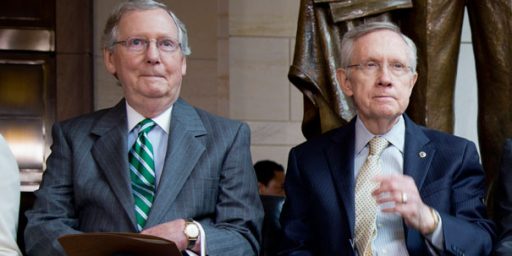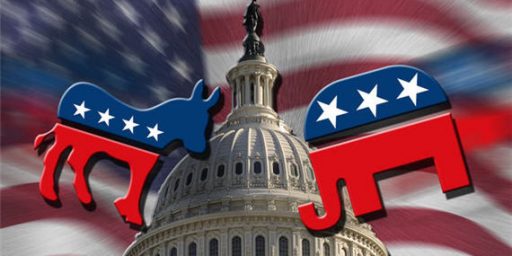Washington More Worried About The Sequester Than The American People
Sean Sullivan and Aaron Blake note that, despite the constant fearmongering that has been coming out of Washington about the sequester, the American people don’t really seem to be all that worried:
In Washington, Republicans and Democrats have been at loggerheads over how best to avert sequestration. In the rest of the country, a remarkably high percentage of Americans take a different view: Bring it on.
Thirty-seven percent of Americans said they would tell their member of Congress to let the deep federal spending cuts known as sequestration go into effect as scheduled, according to a Gallup poll released on Wednesday, while nearly one in five had no opinion. A plurality (45 percent) said they would like to see Congress pass a measure to avert the cuts, but that’s hardly a decisive figure that reflects the alarm bells the Obama administration has been sounding the last couple of weeks.
The public was similarly divided in a Pew Research Center/USA Today poll released last week. Four in 10 Americans said President Obama and Congress should let the cuts go into effect if they cannot reach a deal to avoid them by March 1. Forty-nine percent said the cuts should be delayed.
What gives? For starters, many Americans simply haven’t tuned into the debate over the deep cuts set to hit the federal government on Friday. In the Gallup poll, 38 percent said they were not following the story too closely or at all closely. An even higher percentage of Americans — 48 percent — said the same thing in a Washington Post-Pew poll released earlier this week. It’s hard to strongly oppose cuts you don’t really know that much about.
In an effort to ratchet up pressure on congressional Republicans to agree to Democratic calls for a mixture of new tax revenue and alternate spending cuts as a means of avoiding the sequester, the Obama administration has launched a full-scale effort to warn the public of the dire consequences of inaction. The more Americans know about sequestration, the thinking goes, the greater pressure they will exert on their representative to act to avert it.
The Gallup poll backs this notion up. Among those following the issue very or somewhat closely, 50 percent want to see it averted. Among those following it less closely, that number drops to 39 percent. (Of course, this could be a self-selecting sample; if you think the cuts are going to be bad, you are more likely to pay close attention.)
The reality is that, with just a day left until the cuts begin kicking in, that message that the sequester is a true emergency simply hasn’t sunk in for most Americans. Further complicating the administration’s pitch is that fact that the cuts affect different communities in strikingly different ways. What is dire in some places is a non-issue in others.
Of course, it’s possible that public opinion will change after the cuts kick in and that the Republicans will begin to feel pressure to undue the cuts and replace them with something else. However, for that to happen it would have to be the case that the cuts will indeed be as bad as the White House has been saying. As I’ve noted previously, there’s plenty of reason to believe that this will not be the case. If that happens, then the pressure on the GOP to revisit the cuts will be much less, and we just may find that these sequester cuts will be far more permanent than people in Washington seem to think they will be.





Actually, I think the American people is the last thing that House Republicans worry about.
Or am I misreading your headline?
Sequestration is obviously a very big deal in the D. C. metro, which stands to get hit really hard when contracts don’t get funded and both contractors and Federal employees get furloughed or laid off.
But what I hear from people in other places is basically “Now the D. C. fat-cats get to experience what the rest of the country has been going through the last five years” and a distinct lack of sympathy that a region largely insulated from economic fluctuations is about to have some.
Of course we can add to this headline that libertarians are more worried about themselves than the American people and the sequester…
I think it’s a combo of a few things:
1) “The New Normal” – the economy has been mediocre for some time now.
2) “The Boy Who Cried Wolf” effect. There have been a string of manufactured crises with doomsday reporting about them. Eventually, people just check out. Even when the issues are real.
3) Of course DC cares more about Federal budgetting than the rest of the nation.
I would rather see these cuts than no cuts-problem is that this is mostly posturing anyway.
I think Obama’s doom and gloom over the cuts will likely back fire. I am not convinced they will in the end be all that noticeable to anyone outside of DC.
I think what would be better would be a real compromise with regards to cuts but I don’t particularly see either party compromising when both seem to be hung up on winning battles against the other side than governing.
@Just Me:
Just note though that “Obama’s doom and gloom” isn’t about “these cuts or no cuts.”
He’s asking for better, smarter, cuts. It’s hard to fault that.
@john personna: funny, when do you actually “fault” obama for anything btw?
the cuts are happening and nobody (aside from gov’t hacks who will always “need” more money) is all that concerned.
@bill: Wonder if they will be concerned if airlines cut flights due to lack of Air Traffic Controllers?
Or they have problems getting into see a doctor because of the cuts in reimbursement (the MGMA boards are rife with practices who will be closing their practice to new patients if the 2% cuts happen tomorrow)?
Or the price of meat goes up because the number/hours of meat inspectors get cut?
Or a zillion other impacts to daily life they aren’t thinking about now.
All the kool right wing kids, starting with Doug, are certain that the sequester will have little or no effect, based on their right wing idealogical conclusion that gobvernment spending is EEEVUL and should be cut, no matter what. What do the experts say?
But then what do the economists know, with their Phds and data and math and stuff? Let’s look at another poll of real Murikans:
So maybe Americans don’t believe that the sequester will be all rainbows and lollipops, as the right wingers and the House Republicans believe.One thing is certain: if the cuts go through and the economy tanks, there will be no doubt about who will be wrong and who will be to blame about this.
The elected officials got what they voted for – unless of course they didn’t read the legislation.
Jeez. There are NOT CUTS. The sequestration does nothing more than minimally reduce the projected INCREASE in spending. Spending will still increase. We should be engaging in REAL CUTS. For example, the Department of Homeland Security should be abolished and all of its workers/officials/bureaucrats laid off and forced to get real jobs. The Defense Budget should be cut IN HALF. That would be a good start.
While I’d like to see that sort of thing happen over time, refn, enacting that sort of drastic cut *right this moment* would have negative consequences.
Which is why you do it over time, and why if you can you do it by restaining spending growth. Especially with a fragile economic situation.
My understanding is that the sequester will have something like a -.5% GDP growth impact. That’s not catastrophic. It’s not nothing, either. It is also my understanding that the sequester was deliberately engineered to be “dumb” so that the parties each had reason to work on a compromise agreement to replace the sequester with something better. They haven’t done that, so the Sword of Damocles they set up (perhaps a Dagger of Damocles is a better way of putting it?) is set to fall.
Or the price of meat goes up because the number/hours of meat inspectors get cut?
– See more at: https://www.outsidethebeltway.com/washington-more-worried-about-the-sequester-than-the-american-people/#sthash.KoNqBW2J.dpuf
Price of meat and food are already going up and far more due to the increase in the cost of gas, which is unlikely to go down anytime soon given the main issue are regulations that meant refineries shutting down and no new refineries.
I think other policies are going to affect the cost of meat far more than a reduction in the budget for meat inspectors.
Seems that the president and congress just want to keep putting the problems off for another four years. What happened to that Bowles Commission ? I thought they had some good ideas. Maybe that is the problem. Their ideas made too much sense for the politicians and there was not something in it for them.
What should and can be done:
tax reform: plenty of good ideas out there.
budget reform: how about a 2% cut across every program, agency, and department? This could easily be done by cutting administration costs and use of more technology. The military could save that much by buying their hammers and coffee makers at Sears or Home Depot instead of paying $300 for a hammer and $900 for a coffee maker for airplanes.
How about Congressional costs? You can’t tell me that they can’t find 2% to cut from their budgets.
How about all of those university grants? I mean the crazy ones like $400, 000 for a study of twitter and that infamous study on why kids fall off of tricycles. Just search top ridiculous government grants. You will find millions there.
This “both sides do it” bullshit is no more convincing from you than it is from Doug…
Umm, care to provide any proof that higher gas prices are because of regulations and refineries? Or perhaps you are just spewing more bullshit…
@Just Me: Gas prices are going up because the cartel that controls the price of oil, OPEC, decided to cut production in response to increase American production.
The United States will never be able to reduce the price of gasoline nor oil as long as oil cartel gets to set the price.
Zombieland has far more pressing things about which to worry. Their jobs, for one. Their underwater houses. Paying the bills.
Skyrocketing costs of health insurance coverage. Massive hikes in utilities bills. Casualties of Obamacare and the war on coal.
Higher taxes. Layoffs. RIFs.
Plus have you filled up your gas tank recently? Gas prices are skyrocketing. Cheap and loose money have real world consequences. Shit, by the time Bernanke is done with us we’ll be lucky to avoid 1970’s-style inflation. It could go hyper.
So it’s not at all surprising that Zombieland is not paying all that much attention to the sequestermageddon dog & pony show. There are major differences between the liberal and loopy (BIRM) chattering classes and Main Street. The former have all day to obsess over minutiae and wouldn’t have a clue in any event. The latter quite legitimately are worried sick about making ends meet.
Skyrocketing costs of health insurance coverage
Shit, by the time Bernanke is done with us we’ll be lucky to avoid 1970′s-style inflation. It could go hyper.
–
Perhaps the American people are “comfortably numb”?
They have no idea what’s going on.